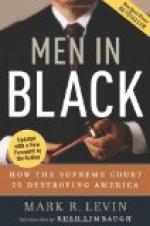The jury is at last selected. The challenges have been exhausted. Both lawyers look as though they were pleased. The judge is informed that the jury is satisfactory, which is, of course, an euphemistic term. No jury is ever entirely satisfactory to both sides, but it is a polite way of saying it is the best they can get under the circumstances. The judge stops trying to balance his check book and looks up at the jury. The attendant motions them to their feet. They hold up their hands. The judge also rises.
“Gentlemen,” he says, “Do you each and all of you solemnly swear to well and truly try the case of John Smith against Thomas Gregory and a just verdict render according to the evidence? So help you God.” They do not answer, but they sit down.
IX
OPENING THE CASE
The jury is chosen, sworn, and sitting in the jury-box. The judge begins unfolding the papers of the case so that he may read the pleadings. The actual trial of issues is about to begin. The court attendant has taken the jurymen’s hats and coats, another attendant has shown spectators to their seats and politely as possible suppressed the young law clerk who does not see why he could not go up to the judge and ask him what became of the case of Jones against Allen that was on the calendar last Thursday and should have been on to-day, or ask if “His Honor decided that motion in the case of Meyer against Cohen.” The doors of the court-room are closed. The attendants go about looking for whisperers and saying, “Cease all conversation.” The lady client is interrupted in telling her lawyer that she thinks the judge has a kind face, but that she does not like the looks of the man in uniform standing next to him, or vice versa. Gradually the court-room quiets and a spirit of expectancy prevails.
But the actual taking of evidence and the hearing of testimony is not yet. Now comes what is known as the opening. So in the tournament, the armored knights entered with a blast of trumpets, their names and titles having been called, and it was customary for them to ride once or twice around the lists to let the judges see their armor, their weapons, their mounts, their trappings and accoutrements, or they might even try a tilt or two at one another. The introductory speech of counsel is somewhat in the nature of a parade or a preliminary skirmish. It may also be compared to the prologue spoken before the beginning of a drama. The speech with the vivid brevity, so common in legal terminology, is called the opening.




